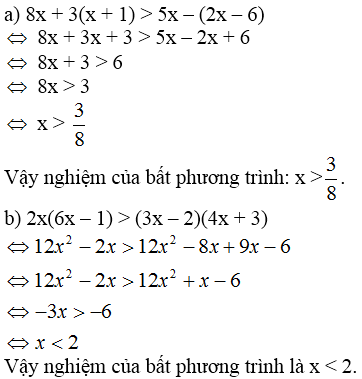Hãy nhập câu hỏi của bạn vào đây, nếu là tài khoản VIP, bạn sẽ được ưu tiên trả lời.

Để \(\left(4x-1\right)\left(x^2+12\right)\left(-x+4\right)>0\Leftrightarrow\hept{\begin{cases}4x-1>0\\-x+4>0\end{cases}}\)
\(\Rightarrow\hept{\begin{cases}4x>1\\-x>-4\end{cases}\Rightarrow\hept{\begin{cases}x>\frac{1}{4}\\x< 4\end{cases}\Rightarrow}\frac{1}{4}< x< 4}\)
Vậy \(\frac{1}{4}< x< 4\)

Vì x2 + 12 > 0 với mọi x
=> (4x-1)(x2+12)(-x+4) > 0
Khi ( (4x-1)(-x+4) > 0
TH1 : \(\hept{\begin{cases}4x-1>0\\-x+4>0\end{cases}}\)
<=> \(\hept{\begin{cases}x>\frac{1}{4}\\x< 4\end{cases}}\)
=> 1/4 < x < 4
TH2 \(\hept{\begin{cases}4x-1< 0\\-x+4< 0\end{cases}}\)
<=> \(\hept{\begin{cases}x< \frac{1}{4}\\x>4\end{cases}}\)
Vì không tồn tai x lớn hơn 4 và nhỏ hơn 1/4
=> TH2 không tồn tại x
=> (4x-1)(x2+12)(-x+4) > 0
khi 1/4 < x < 4
Vì x^2 + 12 > 0 với mọi x
Ta có bất phương trình tương đương: (4x-1)(-x+4) > 0
=> 4x-1 và -x+4 phải cùng dấu.
Trường hợp 1: 4x-1 > 0 và -x + 4 > 0 <=> x>1/4 và x<4 <=> 1/4 < x < 4.
Trường hợp 2: 4x-1 < 0 và -x + 4 < 0 <=> x<1/4 và x>4 (vô lý)
Vậy S={x | 1/4 < x < 4}

\(a,\left(2x^2+1\right)+4x>2x\left(x-2\right)\)
\(\Leftrightarrow2x^2+1+4x>2x^2-4x\)
\(\Leftrightarrow4x+4x>-1\)
\(\Leftrightarrow8x>-1\)
\(\Leftrightarrow x>-\frac{1}{8}\)
\(b,\left(4x+3\right)\left(x-1\right)< 6x^2-x+1\)
\(\Leftrightarrow4x^2-4x+3x-3< 6x^2-x+1\)
\(\Leftrightarrow4x^2-x-3< 6x^2-x+1\)
\(\Leftrightarrow4x^2-6x^2< 1+3\)
\(\Leftrightarrow-2x^2< 4\)
\(\Leftrightarrow x^2>2\)
\(\Leftrightarrow x>\pm\sqrt{2}\)

a)(x-1)(x-4)>0
<=>x-1 và x-4 cùng dấu
TH1:\(\int^{x-1>0}_{x-4>0}\Rightarrow\int^{x>1}_{x>4}\Rightarrow x>4\) (1)
TH2:\(\int^{x-1<0}_{x-4<0}\Rightarrow\int^{x<1}_{x<4}\Rightarrow x<1\) (2)
Từ (1);(2) suy ra x<1 hoặc x>4 thì (x-1)(x-4)>0
b)(x+2)(x-3)<0
<=>x+2 và x-3 trái dấu
TH1:x+2<0 và x-3>0
=>x<-2 và x>3
=>3<x<-2 (vô lí,loại)
TH2:x+2>0 và x-3<0
=>x>-2 và x<3
=>-2<x<3 (chọn)
Vậy -2<x<3 thì (x+2)(x-3)<0

a) \(8x+3\left(x+1\right)>5x-\left(2x-6\right)\)
⇒ \(8x + 3x + 3 > 5x - 2x + 6\)
⇒ \(11x+3>3x+6\)
⇒ \(11x - 3x > 6 -3\)
⇒ \(8x > 3\)
⇒ \(8x.\dfrac{1}{8}>3.\dfrac{1}{8}\)
⇒ \(x>\dfrac{3}{8}\)
S = \(\left\{x\backslash x>\dfrac{3}{8}\right\}\)
b) \(2x(6x-1) > (3x -2)(4x+3)\)
⇒ \(12x^2 - 2x > 12x^2 +9x -8x -6\)
⇒ \(12x^2 - 2x > 12x^2 + x - 6\)
⇒ \(-2x-x>12x^2 -6-12x^2\)
⇒ \(- 3x > -6 \)
⇒ \(x > 2\)
S = {x / x > 2}

\(\left(x-1\right)^2-1+x^2=\left(1-x\right)\left(x+3\right)\)
\(\Leftrightarrow\left(x-1\right)^2+\left(x-1\right)\left(x+1\right)=\left(1-x\right)\left(x+3\right)\)
\(\Leftrightarrow2x\left(x-1\right)=\left(1-x\right)\left(x+3\right)\)
\(\Leftrightarrow2x\left(x-1\right)+\left(x-1\right)\left(x+3\right)=0\)
\(\Leftrightarrow\left(x-1\right)\left(3x+3\right)=0\)
\(\Rightarrow x=\pm1\)
Giúp tớ mấy câu còn lại đi các cậu, tớ cần gấp lắm ạ ;;-;;

\(\left(x-1\right)\left(x+1\right)-2\left(2x+3\right)\le\left(x-2\right)^2+x\)
\(\Leftrightarrow x^2-1-4x-6\le x^2-4x+4+x\)
\(\Leftrightarrow x^2-4x-7\le x^2-3x+4\)
\(\Leftrightarrow x^2-4x-x^2+3x\le7+4\)
\(\Leftrightarrow-x\le11\)
\(\Leftrightarrow x\le-11\)

\(\left(4x-1\right)\left(x^2+12\right)\left(-x+4\right)>0\)
\(\Leftrightarrow\hept{\begin{cases}4x-1>0\Leftrightarrow4x>1\Leftrightarrow x>\frac{1}{4}\\x^2+12>0\Leftrightarrow x^2>-12\Leftrightarrow x>12\\-x+4>0\Leftrightarrow-x>-4\Leftrightarrow x< 4\end{cases}}\)